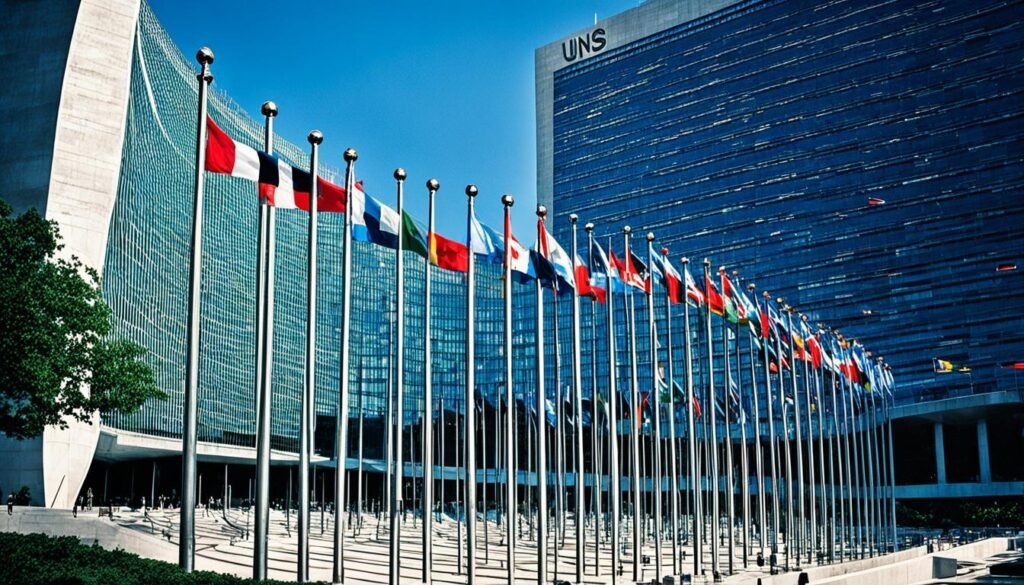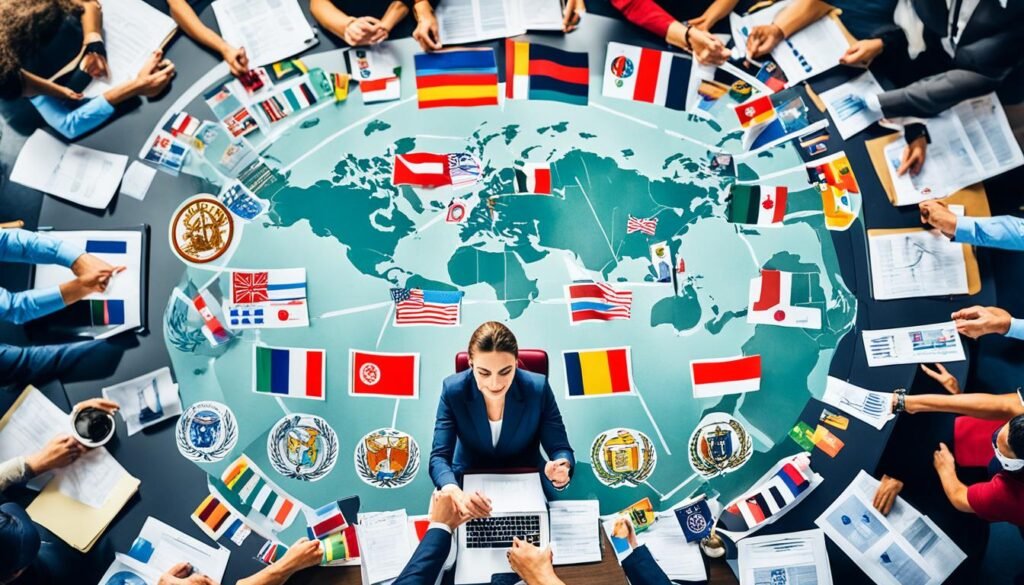International law defines the legal responsibilities of States in their conduct with each other, and their treatment of individuals within State boundaries. International law’s domain encompasses a wide range of issues of international concern, such as human rights, disarmament, international crime, refugees, migration, problems of nationality, the treatment of prisoners, the use of force, and the conduct of war, among others. International law also regulates the global commons, such as the environment and sustainable development, international waters, outer space, global communications and world trade.
Key Takeaways : International Law
- International law governs the conduct of states and other international actors, including individuals and international organizations.
- The enforcement of international law relies on a combination of mechanisms, including treaties, customary law, and general principles of law.
- The United Nations plays a central role in the development and enforcement of international law through its various organs and specialized agencies.
- Enforcement mechanisms include sanctions, self-help and countermeasures, as well as monitoring and pressure from the international community.
- Specialized agencies and technical assistance from international organizations support compliance with international law.
International Law: Definition and Scope
International law is a comprehensive body of rules, principles, and agreements that govern the conduct of sovereign states and other international entities in their relations with one another. It encompasses a wide range of issues of international concern, including human rights, disarmament, international crime, refugees, migration, the treatment of prisoners, the use of force, and the conduct of war. International law also regulates the global commons, such as the environment, international waters, outer space, global communications, and world trade.
Domains of International Law
International Economic Law
This area of international law deals with the rules and principles governing international trade, investment, and finance. It includes agreements like the General Agreement on Tariffs and Trade (GATT), the World Trade Organization (WTO), and various bilateral and multilateral investment treaties.
International Security Law
International security law focuses on the maintenance of international peace and security. It covers issues such as the use of force, disarmament, peacekeeping operations, and the regulation of weapons of mass destruction.
International Criminal Law
This domain of international law deals with the prosecution and punishment of individuals for international crimes, such as genocide, crimes against humanity, war crimes, and the crime of aggression. It includes the Rome Statute of the International Criminal Court and various ad hoc international tribunals.
| Domain | Key Elements |
|---|---|
| International Economic Law | International trade, investment, and finance agreements |
| International Security Law | Use of force, disarmament, peacekeeping, weapons regulation |
| International Criminal Law | Prosecution of international crimes like genocide, crimes against humanity, war crimes |
| International Human Rights Law | Protection and promotion of individual and collective human rights |
| International Environmental Law | Conservation and sustainable use of the global environment |
| Law of the Sea | Regulation of activities in the world’s oceans and seas |
Sources of International Law

The four principal sources of international law are treaties and conventions, customary law, general principles of law, and subsidiary means of determining rules of law.
Treaties and Conventions
International treaties and conventions, also known as international agreements, are formal, written documents that establish binding obligations between states. They are negotiated and adopted by states and international organizations, and can cover a wide range of topics, from human rights to the law of the sea. The Vienna Convention on the Law of Treaties provides the legal framework for the creation, application, and interpretation of these international agreements.
Customary Law
Customary international law consists of rules that derive from the consistent practice of states, accompanied by the belief that such practice is required by law (opinio juris). The International Court of Justice has identified two essential elements for the formation of customary law: (1) a general practice among states, and (2) the acceptance of that practice as legally binding. Customary law can be found in areas such as the law of the sea, diplomatic relations, and the use of force.
General Principles of Law
General principles of law are basic legal principles recognized by the world’s major legal systems, such as principles of equity, proportionality, and non-discrimination. These principles can be used to fill gaps in international law and provide a basis for the development of new norms. They are an important source of international criminal law, international human rights law, and international humanitarian law.
| Source of International Law | Definition | Examples |
|---|---|---|
| Treaties and Conventions | Formal, written agreements between states or international organizations | The Geneva Conventions, the International Covenant on Civil and Political Rights, the United Nations Convention on the Law of the Sea |
| Customary Law | Rules derived from the consistent practice of states, accompanied by the belief that such practice is required by law | The prohibition on the use of force, diplomatic immunity, the right to self-defense |
| General Principles of Law | Basic legal principles recognized by the world’s major legal systems | Equity, proportionality, non-discrimination, good faith |
These sources of international law work together to create a comprehensive legal framework that governs the conduct of states, international organizations, and other actors in the global community.
Role of the United Nations

The United Nations plays a central role in the development and enforcement of international law. As the primary intergovernmental organization promoting global cooperation, the UN and its various bodies have been instrumental in codifying international law, establishing norms, and facilitating the resolution of disputes between states.
The Security Council and International Law
The UN Security Council is responsible for maintaining international peace and security, and it has the authority to take enforcement action against states that violate international law. The Security Council can impose economic sanctions, authorize the use of force, and even establish international courts and tribunals to address violations of international law.
The General Assembly and International Law
The UN General Assembly also plays a significant role in the development of international law. The General Assembly can adopt resolutions that codify international legal principles and norms, and it can also establish subsidiary bodies and special committees to address specific legal issues.
Sixth Committee (Legal)
The Sixth Committee of the UN General Assembly, also known as the Legal Committee, is the primary forum for the consideration of legal questions in the United Nations. This committee is responsible for addressing a wide range of international legal matters, including the progressive development of international law and its codification.
Enforcement Mechanisms

International law utilizes various enforcement mechanisms to ensure compliance and address violations. These include both formal and informal approaches that leverage the collective power of the international community.
Chapter VII Sanctions
Under Chapter VII of the United Nations Charter, the UN Security Council has the authority to impose binding sanctions on states that threaten international peace and security. These sanctions can range from economic measures, such as trade embargoes and asset freezes, to military interventions. The Security Council’s ability to impose coercive sanctions is a crucial tool for enforcing international law, particularly with regards to issues of international human rights, international humanitarian law, and international criminal law.
Self-Help and Countermeasures
In the absence of a centralized enforcement mechanism, states may resort to self-help measures and countermeasures to enforce their rights under international law. This can include retorsions, such as the suspension of treaty obligations, as well as more coercive countermeasures, like economic sanctions or the suspension of diplomatic relations. However, the use of such measures is subject to strict limitations under international law to prevent the escalation of disputes.
Monitoring Bodies and Pressure
A range of international organizations, treaty bodies, and monitoring mechanisms play a crucial role in overseeing compliance with international law. These include the International Court of Justice, the International Criminal Court, and various United Nations committees and special rapporteurs. Through their monitoring, reporting, and recommendations, these bodies exert pressure on states to uphold their international legal obligations. Additionally, civil society organizations and the international community as a whole can bring attention to and apply pressure on states to address violations of international law.
International Law

International law is a crucial framework that governs the relationships and interactions between nations, international organizations, and other global actors. As the world becomes increasingly interconnected, the role of international law in addressing complex global challenges has become more essential than ever before. From human rights to international trade, international law provides a structure for promoting peace, security, and cooperation on a global scale.
At the heart of international law are the principles of sovereignty, equality, and non-intervention, which underpin the United Nations and other international organizations. These principles guide the actions of states and ensure that the global community respects the autonomy and rights of each nation. However, international law also recognizes the need for collective action and cooperation to address transnational issues, such as environmental protection, international humanitarian law, and international criminal law.
| Key Aspects of International Law | Description |
|---|---|
| Public International Law | Governs the relationships and interactions between states and international organizations, addressing issues such as human rights, international security, and environmental protection. |
| Private International Law | Regulates cross-border commercial transactions, family law, and other private-sector activities, ensuring the rights and obligations of individuals and businesses are protected. |
| International Criminal Law | Defines and punishes international crimes, such as genocide, war crimes, and crimes against humanity, ensuring accountability and justice on a global scale. |
As the international community continues to grapple with complex global challenges, the role of international law in shaping and guiding collective responses has become increasingly vital. By promoting cooperation, establishing norms, and providing a framework for dispute resolution, international law plays a crucial role in fostering global stability, security, and sustainable development.
Specialized Agencies and Technical Assistance
Specialized agencies of the United Nations, such as the World Health Organization (WHO), the International Labor Organization (ILO), and the United Nations Educational, Scientific and Cultural Organization (UNESCO), play a crucial role in supporting compliance with international law through technical assistance and capacity-building programs. These organizations work closely with member states to help them implement and uphold their obligations under various international treaties and conventions, particularly in areas related to human rights, labor standards, public health, and sustainable development.
For instance, the WHO provides technical guidance and support to governments in implementing the International Health Regulations, a legally binding instrument that establishes a global framework for coordinating the prevention, detection, and response to public health emergencies. Similarly, the ILO works with countries to align their national labor laws and policies with the organization’s core labor standards, which are recognized as part of customary international law.
Additionally, international organizations like the International Criminal Court (ICC) and the International Court of Justice (ICJ) offer technical assistance and capacity-building programs to help states strengthen their domestic legal frameworks and institutions to better prevent and prosecute international crimes, such as genocide, war crimes, and crimes against humanity. These efforts are instrumental in fostering a more effective system of international law enforcement and promoting the rule of law at the global level.
Also Read: Individual Rights And Liberties In Constitutional Law
Conclusion
FAQs
Q: What is international law?
A: International law is a set of rules and principles that govern relations between states and other international actors.
Q: What are the sources of international law?
A: The sources of international law include treaties, customary international law, general principles of law, and judicial decisions.
Q: How is international law enforced?
A: International law is enforced through various mechanisms such as diplomatic pressure, sanctions, international courts, and enforcement actions by international organizations.
Q: What is the role of international courts in enforcing international law?
A: International courts, such as the International Court of Justice and the International Criminal Court, play a crucial role in interpreting and enforcing international legal norms.
Q: Can individuals be held accountable under international law?
A: Yes, individuals can be held accountable under international law for actions such as human rights violations and international crimes.
Q: How does international law intersect with human rights?
A: International law includes mechanisms for protecting and enforcing human rights, such as international human rights treaties and bodies.
Q: What is the difference between international law and domestic law?
A: International law governs relations between states and international actors, while domestic law regulates activities within a specific country.
Source Links
- https://www.un.org/en/our-work/uphold-international-law
- https://www.law.cornell.edu/wex/international_law
- https://www.asil.org/insights/volume/1/issue/1/enforcing-international-law





